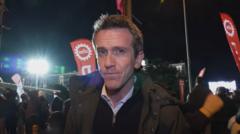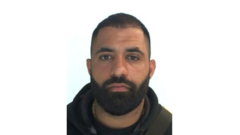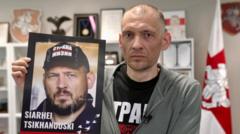**Mark Lowen's removal highlights tensions between Turkey's government and international media, as protests continue against perceived political repression.**
**BBC Reporter Mark Lowen Expelled from Turkey Amid Protests Coverage**

**BBC Reporter Mark Lowen Expelled from Turkey Amid Protests Coverage**
**The deportation of BBC's Mark Lowen raises concerns about press freedom in Turkey following protests over a prominent political figure's arrest.**
In a significant incident underscoring the fraught atmosphere for press in Turkey, BBC correspondent Mark Lowen was deported from Istanbul after being arrested while covering ongoing protests. His detention occurred in connection with unrest linked to the recent arrest of Istanbul Mayor Ekrem Imamoglu, who is seen as a major challenger to President Recep Tayyip Erdogan. Imamoglu, jailed on corruption charges that he denies, has been designated by his party as a contender in the 2028 presidential elections.
The BBC issued a statement confirming that Turkish authorities deported Lowen after a 17-hour detention, during which he was seized from his hotel. The official notice cited his presence as a "threat to public order." Lowen expressed profound distress over the situation, especially given his previous five-year residency in Turkey, emphasizing the importance of press freedom and objective reporting as pillars of democratic society.
Deborah Turness, CEO of BBC News, condemned the deportation as a troubling incident and emphasized Lowen's professionalism and expertise in covering Turkey. Human Rights Watch’s Turkey director, Emma Sinclair-Webb, also criticized the expulsion, warning that it sends a dire message to international media regarding the Turkish government's stance on critical reporting.
As protests across Turkey continue, leading to thousands of detentions, many consider Imamoglu's arrest to be politically charged. President Erdogan has denounced the protests as "evil," indicating strong opposition to dissent. While nightly protests have lessened, the Republican People's Party (CHP) plans to host a rally in Istanbul as part of their ongoing resistance against governmental suppression.
The BBC issued a statement confirming that Turkish authorities deported Lowen after a 17-hour detention, during which he was seized from his hotel. The official notice cited his presence as a "threat to public order." Lowen expressed profound distress over the situation, especially given his previous five-year residency in Turkey, emphasizing the importance of press freedom and objective reporting as pillars of democratic society.
Deborah Turness, CEO of BBC News, condemned the deportation as a troubling incident and emphasized Lowen's professionalism and expertise in covering Turkey. Human Rights Watch’s Turkey director, Emma Sinclair-Webb, also criticized the expulsion, warning that it sends a dire message to international media regarding the Turkish government's stance on critical reporting.
As protests across Turkey continue, leading to thousands of detentions, many consider Imamoglu's arrest to be politically charged. President Erdogan has denounced the protests as "evil," indicating strong opposition to dissent. While nightly protests have lessened, the Republican People's Party (CHP) plans to host a rally in Istanbul as part of their ongoing resistance against governmental suppression.



















